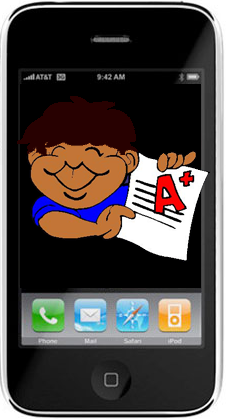
We’ve all heard about the incredible growth of the App Store, which has seen more than 500 million downloads across over 15,000 applications. Much of the innovation (or at least, money) has come from games and other entertaining apps like Smule’s Ocarina and Pandora Radio. But the iPhone is also poised to make huge strides in a somewhat less glamorous space: study guides.
With gigabytes of storage, dimensions comparable to traditional note cards, and a full color screen, the iPhone is the ultimate study companion. And, unlike many of its smartphone competitors, the iPhone and iPod Touch have huge appeal for the younger crowds that generally flock to study materials.
Unfortunately the current state of the ‘Education‘ section of the App Store leaves something to be desired – many of the top apps are poorly designed, and some of the best-selling applications in both the ‘paid’ and ‘free’ sections have fewer than 100 total reviews. I blame this mostly on a general lack of awareness; something that could easily changed if Apple started marketing the iPhone’s learning applications as heavily as it has its games. Regardless of current demand, some of the large test-prep companies are beginning to realize there’s money to be made here.
In late December, Kaplan teamed with app developer Jirbo to release its first test prep application, SAT Flashcubes. The result: a quirky vocab tutor with spinning cubes that hasn’t fared very well, with a grand total of six reviews. But Kaplan isn’t putting all of its eggs in one basket: today it released its second (and more conventional) application for the NCLEX-RN exam, and have at least eight more in the works. Kaplan is the first mover (which may be key), but don’t be surprised if The Princeton Review, Barrons, and other large publishers have their own apps on the drawing board.
In the meantime, a number of smaller publishers have released their own applications, spanning everything from basic flash cards and SAT vocabulary to memorizing the amino acids (a rite of passage for every pre-med student). Many of these apps seem to work well, but they may be overtaken once the aforementioned “trusted names” start establishing a larger presence.
Test prep and study guides represent a massive market, with many teens and young adults (and their parents) willing to drop serious amounts of money on anything that could conceivably help get higher test scores. Many of these students are so driven that, with a large enough selection, the App Store’s Education section could lead them to buy an iPod Touch or iPhone when they wouldn’t have gotten one otherwise. So maybe Apple should give the games a little less attention for a while, and let everyone know that they’ve got “the smartest iPod ever”.